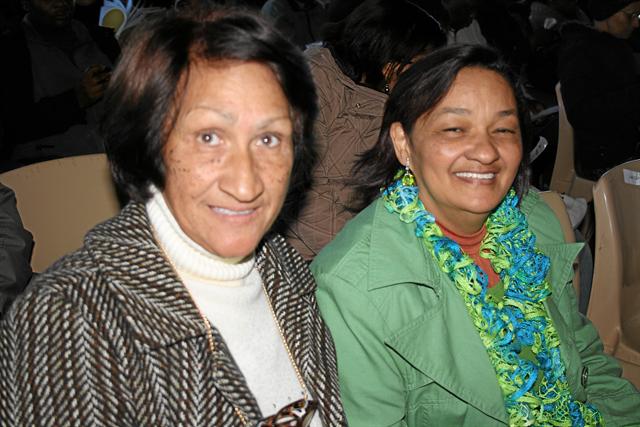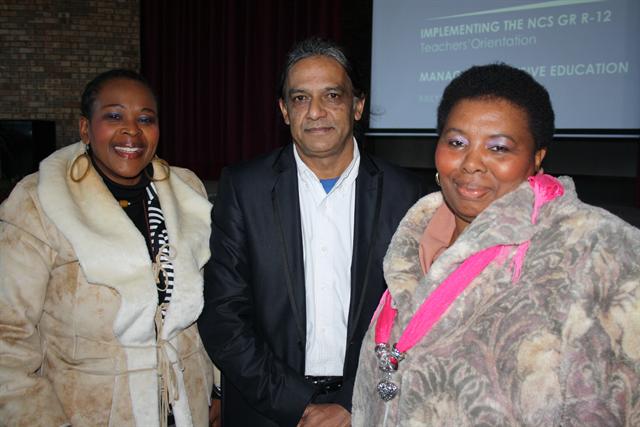Dr Sigamoney Naicker, Chief Director: Curriculum Development, attended Monday's first sessions to ensure quality in the orientation of the 347 Intermediate phase teachers from the George area. Dr Naicker commented about the "excellent turnout and great commitment, enthusiasm and participation of teachers" in the orientation programme.
The Intermediate phase of education has been identified as a critical area of intervention.
The National Curriculum Assessment Policy Statement (NCS) sets out the content of what has to be taught (i.e. CAPS) but it is up to teachers to plan how they will teach this content to the diverse learning needs in their classroom.
"This orientation is part of a programme that attempts to prepare the system for the important change to the curriculum."
Marilyn Matthys and Muriel Engelbrecht, Grade 4 teachers from Delville Park Primary, are both looking forward to the implementation of CAPS. They feel it is the re-implementation of teaching the basics, a curriculum they followed when they first started teaching before the introduction of Curriculum 2000. "Curriculum 2000 just confused teachers and learners," Matthys believed, and Engelbrecht added that in her opinion, a whole generation of learners got lost as a result of this expiring curriculum.
The three day orientation, which started on Monday, addressed current realities such as the lack of competency of learners in literacy and numeracy and teacher complaints about the complexities of the NCS.
Solutions included the development of one CAPS per subject and simplifying and streamlining assessments. Furthermore, every effort must be made by schools to strengthen their First Additional Languages, and English in particular, which will hopefully yield the expected results in later studies.
The format of CAPS in each of the six Intermediate phase subjects is as follows: the introduction includes a background, overview, general aims and time allocation; section 2 provides information about the subject, its purpose, aims, time allocation and resources; section 3 is an annual teaching plan that shows teachers 'What should I teach?', 'When should I teach?' and 'How should I teach a particular subject?'; section 4 is dedicated to assessment: i.e. informal, formal, requirements and examinations, recording and reporting and moderation.
Jeremy Robus, a Grade 6 Holy Cross Primary teacher who moved to George six months ago, felt that he was "thrown into the deep end at the right time." Robus, who has moved provinces and gone from teaching at an independent school to a public school, is thankful of being reminded about the basics of teaching and what material is important to teach.
Parents are encouraged to ensure their children read, write and do mathematics every day, utilising their textbooks and workbooks.
According to Ms Marietjie Beukes, Western Cape Education Department's General Education and Training coordinator for Eden/Karoo, this orientation programme will be followed by more detailed training during the next six months. Questions and issues raised by teachers during this week's programme will also be addressed during this time.
Last month, 350 volunteer teachers were trained to serve as lead teachers to assist their colleagues with regard to CAPS.
The implementation of CAPS in Grade 11 is also scheduled for 2013, whereas Grades 7-9 and 12 will see CAPS in 2014. Similar orientation programmes took place in six other Eden/Karoo towns including Oudtshoorn, Mossel Bay and Beaufort West, with approximately 1300 teachers in attendance.

Delville Park Primary School grade 4 teachers, Muriel Engelbrecht (left) and Marilyn Matthys, are looking forward to the implementation of the 'new' curriculum next year.

Dr Sigamoney Naicker (WCED Chief Director: Curriculum Development) attended the CAPS Orientation Programme in George, along with (left) Ntembeko Dyasi (WCED learning support advisor) and Nozuko Blou (WCED Foundation Phase advisor).
ARTICLE AND PHOTOS: LEEANNE PRATT, GEORGE HERALD JOURNALIST
















